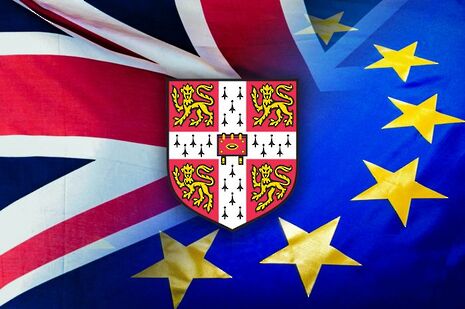85% back Remain in Varsity EU poll
Varsity’s survey of Cambridge members, which received over 900 responses, shows overwhelming support for Britain’s continued membership of the EU

Over 85 per cent of members of the University of Cambridge want Britain to remain in the European Union, according to a poll conducted by Varsity, ahead of the referendum on 23rd June.
The poll, which surveyed 920 students and staff, revealed that only 14 per cent of respondents intend to vote to leave the EU, with one per cent undecided.
Undergraduate students were slightly more likely to support Britain remaining in the EU than graduate students, with 86 per cent of undergraduates supporting a Remain vote, as opposed to 82 per cent of graduate students. Varsity’s poll also revealed a significant gender gap in participants’ voting intentions, with male respondents nearly four times more likely to vote to leave the EU.
It also revealed divisions in how students and staff from different colleges intend to vote. Christ’s is the most Eurosceptic college, with 29 per cent intending to vote Leave. Fitzwilliam and Murray Edwards emerged as the most pro-European colleges, with 100 per cent of respondents from those colleges intending to vote Remain.
Speaking to Varsity about the results, Damiano Sogaro, Secretary of the Cambridge for Europe Campaign, expressed his pleasure at the results.
“We are happy to see that the overwhelming majority of students share our view of the importance of EU funding for our research, EU collaboration networks for smooth collaboration with other countries, free movement of peoples for job prospects, and democratising influence in difficult regions of Europe all whilst strengthening environmental safeguards.” However, he stated: “we are increasingly concerned with whether this will translate into votes. Many students will be graduating, or starting internships.”
“Voting may seem difficult, or unnecessary because of a belief that the UK will vote to remain regardless. This could not be further from the truth. Without a good turnout from the younger age brackets, there is a real danger [of] our voices being marginalised”, he added.
Last month, Universities UK surveyed over 2,000 students, and found that 63 per cent of them were not able to name the date of the referendum as the 23rd, while 54 per cent did not know that the month of the referendum was June. However, despite these findings, 72 per cent of those surveyed said that they thought the result of the referendum would have a significant impact on students’ futures.
Varsity’s results are in line with national polling of students’ views: last month, graduate career app Debut surveyed 12,000 students, and found that 81 per cent planned to vote to remain in the EU, with 10 per cent intending to vote to leave.
However, there is a clear gap between the views of students and those of the general population, with the most recent national polling suggesting that the referendum result will be extremely close.
A YouGov online poll from 10th June put the Leave campaign on 43 per cent, and Remain on 42 per cent, with 15 cent undecided. An online Opinium poll from the same day put Remain on 44 per cent, and Leave on 42 per cent, with 13 per cent undecided.
 Features / Cambridge’s first Foundation Year students: where are they now?7 April 2024
Features / Cambridge’s first Foundation Year students: where are they now?7 April 2024 News / Cambridge University cancer hospital opposed by environmental agency12 April 2024
News / Cambridge University cancer hospital opposed by environmental agency12 April 2024 Comment / UK universities are sacrificing widening access for foreign fees11 April 2024
Comment / UK universities are sacrificing widening access for foreign fees11 April 2024 Film & TV / Dune: Part Two is a true epic for the ages11 April 2024
Film & TV / Dune: Part Two is a true epic for the ages11 April 2024 News / Industrial Revolution began 100 years earlier than thought, claims Cambridge research7 April 2024
News / Industrial Revolution began 100 years earlier than thought, claims Cambridge research7 April 2024




